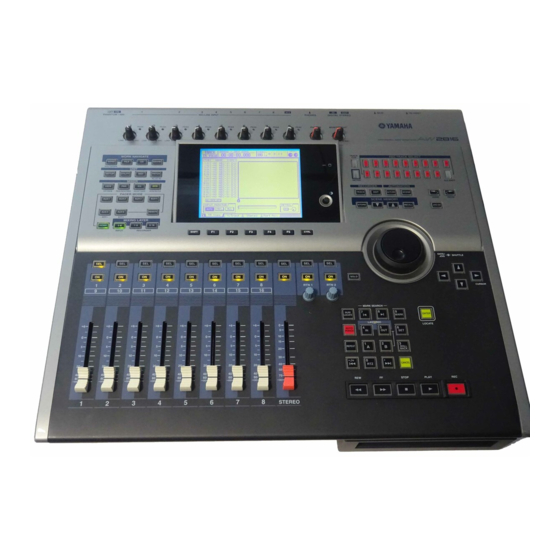Yamaha AW2816 Навчальний посібник - Сторінка 5
Переглянути онлайн або завантажити pdf Навчальний посібник для Музичний інструмент Yamaha AW2816. Yamaha AW2816 31 сторінка. Professional audio workstation, recording101
Також для Yamaha AW2816: Посібник з експлуатації (2 сторінок), Посібник з оновлення (2 сторінок), Посібник (32 сторінок)

Recording on the AW2816
Recording sound from the mics
onto the hard disk
When you have finished adjusting the input level,
connect the input to the track on which it will be
recorded. In the WORK NAVIGATE section, press the
[QUICK REC] key. On the left side are the sounds
being input to the AW2816, and on the right side are
tracks 1–16 (a total of sixteen tracks) on which you
can record. Try pressing [ENTER] on the circle for
CH1 in the left. In the screen, a connection will be
made between CH1 and TR1. In the same way, con-
nect CH2 and TR2. In the CH SETTING area, select
[FLAT] to select the default settings when recording
for the first time.
When you have completed these preparations, press
[ENTER] on EXECUTE, located at the far right. You will
be asked whether you are sure, so select OK. If the
REC TRACK SELECT 1 and 2 indicators in the upper
right of the AW2816 are blinking, you are ready.
Although you could record immediately, let's pair the
two inputs so that we can record in stereo.
In the MIXING LAYER section, press INPUT [1-8], and
then press the channel 1 [SEL] key to make it light.
Now in the MIXER section, press [VIEW], and then
press [F1] to access the CH View screen. Use the
[CURSOR] keys to move to the MONOx2 area beside
PAIR, and press [ENTER]. You will be asked how you
want to pair adjacent channels, so for this example,
press [ENTER] on INPUT 1 2. This lets you simulta-
neously control the settings for the two inputs channel
1 and 2. To try this out, move the fader of input chan-
nel 1 up and down. The fader of the adjacent channel
should move with it.
4
Press the [ON] key located immediately above the
input channel 1 fader, making it light. (At this time,
the channel 2 [ON] key will also light if pairing has
been enabled.) A volume meter will be displayed at
the upper right of the CH View screen, so adjust the
fader, and check whether sound is being input from
each mic into the AW2816. You will be able to record
with the best-quality sound if the level is adjusted as
high as possible without allowing the OVER indicator
in the meter to light when the loudest sounds are
played. If you were able to adjust the gain control suc-
cessfully in the beginning of this process, a fader posi-
tion of approximately 0 dB should be just right.
Now we can just record. When you are ready to begin
playing, hold down the [REC] key and press the
[PLAY] key. When you are finished playing, press the
[STOP] key.
Play back the recorded sound
Let's listen to the sound that was recorded. If you used
the two mics in stereo, press the MIXER section [PAN]
key, and then press [F2] to open the Pan MONI
screen. If you have just created the song (and not
modified the settings), all sixteen tracks should be
heard from the middle (CENTER). In the screen, move
the cursor to the Pan control for track 1, and turn the
[DATA/JOG] dial all the way to the left (L16). In the
same way, set track 2 all the way to the right (R16).
What if you recorded the right mic on track 1? If so,
simply invert the left/right settings of the two tracks.
However since the input channels and tracks are
paired as 1-2, 3-4, ... etc., you should use the odd-
numbered channel to input the left sound.
After you have made Pan settings, press the 0 [RTZ]
key of the keypad to return to the beginning of the
song, and press the [PLAY] key to play back. If you do
not hear sound, press the MIXING LAYER section
RECORDER [1-8] key, make the [ON] key light for
tracks 1 and 2 of the recorder, and make sure that the
faders are raised. Also make sure that the red STEREO
fader is raised and the PHONES control (if using head-
phones) or MONITOR OUT control (if using con-
nected monitor speakers) are not lowered all the way.
If you still do not hear sound, it is possible that some
mistake was made when recording, so try the proce-
dure described above once again, checking each step
as you perform it.
Tutorial
